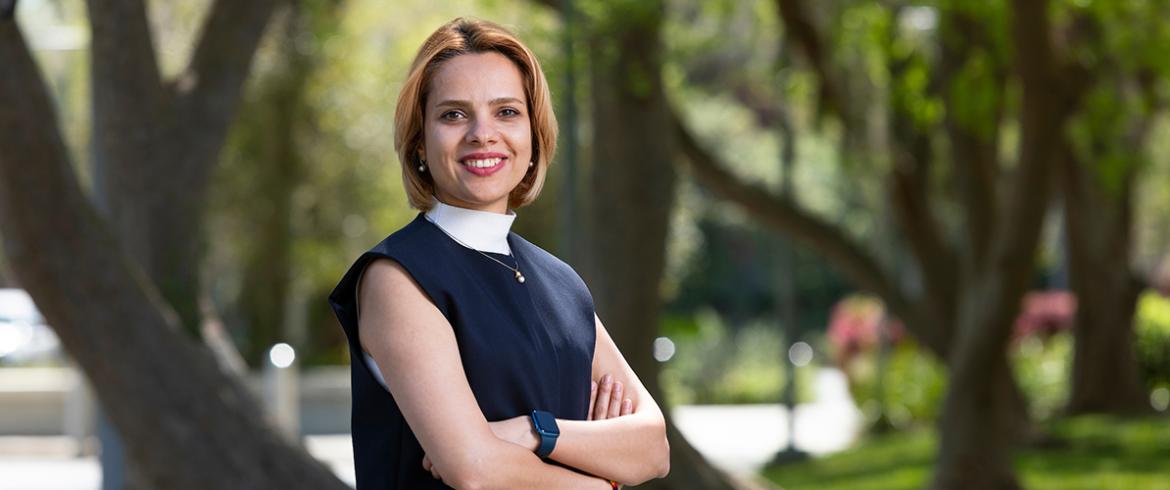
Maryam Pakdehi at FAMU-FSU College of Engineering in Tallahassee, Florida on March 12, 2024. Pakdehi won the FSU Graduate Student Leadership Award for 2024-2025. (Scott Holstein/FAMU-FSU College of Engineering)
FAMU-FSU engineering student Maryam Pakdehi earns FSU’s Graduate Leadership Award for innovative machine learning research improving flood predictions and disaster preparedness technology
Maryam Pakdehi, a doctoral student in Civil and Environmental Engineering at the FAMU-FSU College of Engineering, has been honored with the 2024-2025 Graduate Student Leadership Award from Florida State University (FSU).
This prestigious award recognizes outstanding contributions to campus and the wider community, celebrating student leaders who demonstrate exceptional commitment to their pursuits. Co-sponsored by the FSU Graduate School and the Congress of Graduate Students (COGS), this annual accolade highlights graduate students’ vital role in enhancing the academic environment.
Innovation in Flood Prediction Technology
“Receiving this award is a great honor and a source of encouragement,” Pakdehi said. “It’s truly motivating, and I’ve been fortunate to receive strong support from my advisor, Dr. Ahmadisharaf, our department chair, Dr. Spainhour, the Civil and Environmental Engineering department, and the engineering community, making this journey even more rewarding.”
Under the guidance of her major professor, Ebrahim Ahmadisharaf, Pakdehi’s research addresses critical environmental challenges through cutting-edge technology. Her work focuses on improving flood predictions, which are crucial for community safety during disasters like hurricanes.
“Ultimately, my work helps ensure that communities are better prepared for floods, reducing health risks and property damage in the long run.” —Maryam Pakdehi
“By developing advanced and innovative models like machine learning and other physics-based models, we aim to create more accurate flood forecasts,” Pakdehi said. “This is important because reliable flood predictions can help governments and organizations make better decisions about disaster readiness, potentially saving lives and reducing economic damages, which can reach billions of dollars after major floods. Ultimately, my work helps ensure communities are better prepared for floods, reducing health risks and property damage in the long run.”
Overcoming Data Challenges
According to Pakdehi, flood data collection presents significant challenges. While satellite images can reveal flood locations, they often lack crucial depth information. Stream gauges and other flood data sources are limited and typically contain uncertainties that complicate prediction efforts.
Her research aims to bridge these gaps through computational innovation, creating more reliable forecasting tools for emergency management and disaster preparedness.
Student Leadership
In addition to her research achievements, Pakdehi has made significant contributions as a student leader on campus. In 2023, she established Tea+Talk, a weekly student networking event, to foster a sense of community among graduate students at the college. Building on this success, she worked with other civil engineering graduate students to establish the CEE Graduate Student Association in 2024. As the inaugural president, she helped arrange social and networking events ranging from bowling nights to career-readiness seminars and research symposia. Pakdehi was also elected to the FSU Congress of Graduate Students, and served as the president of FSU’s Iranian Student Association as well as a member of FSU’s Student Affairs Committee.
Advice for Graduate Success
As she prepares to be recognized at the upcoming Celebration of Graduate Student Excellence in April, Pakdehi shares advice for fellow doctoral candidates: “Finding innovative research topics is essential and maintaining mental wellness is crucial, given the demanding nature of a PhD program. It’s important to stay focused on your studies while engaging in meaningful extracurricular activities to help develop valuable skills.”
Pakdehi’s achievement exemplifies the transformative impact motivated students can have on their communities. Her ongoing doctoral work inspires the next generation of student leaders at Florida State University and beyond.
Editor’s Note: This article was edited with a custom prompt for Claude 3.7 Sonnet, an AI assistant created by Anthropic. The AI improved clarity, structure and readability while preserving the original reporting and factual content. All information and viewpoints remain those of the author and publication. This disclosure is part of our commitment to transparency in our editorial process. Last edited: 04/16/2025.
RELATED ARTICLES
Ready for Risk: Mapping Flood Hazards in Bay County, Florida
Civil Engineering Professor Uncovers the Impacts of Hurricane Flooding on Mold Growth
Researchers Examine How Drought, Water Volume Affect Nutrients in Apalachicola River
